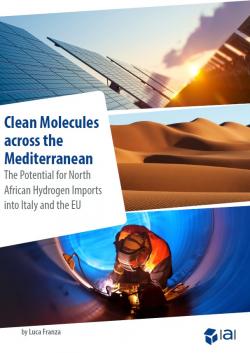Clean Molecules across the Mediterranean. The Potential for North African Hydrogen Imports into Italy and the EU
Hydrogen is the most promising vector for harnessing North Africa’s largely untapped renewable energy potential. Low-carbon hydrogen produced in North Africa can play an important role in enabling the European Union and Italy to reach their increasingly ambitious decarbonisation targets as a complement to electrification and locally produced renewables. It is estimated that the EU could achieve cost savings by producing at least part of its future renewable energy needs in neighbouring high-yield regions. Italy is set to play a particularly important function as both a gateway and a catalyst for North African hydrogen exports. In turn, North Africa stands to benefit from hydrogen both as a source of revenues and as an instrument of diversification, industrialisation and local economic development. This would in turn improve social resilience, increase political stability, reduce the risk of radicalisation and limit migration flows. Italy has a particularly strong strategic interest in all of these areas, given its geographic location in the Central Mediterranean and marked exposure to social, political and security developments in North Africa. North African hydrogen could also create profitable business opportunities for several Italian companies. In sum, hydrogen can contribute to fighting climate change while preserving positive trade interdependence across the Mediterranean. Strong coordination between the private sector and policy-makers is going to be key to abate costs along the hydrogen value chain and launch successful international hydrogen trade schemes.
-
Details
Rome, IAI, April 2021, 42 p. -
ISBN/ISSN/DOI:
978-88-9368-183-4
Foreword
Introduction
1. Harnessing North Africa’s renewable energy potential: Evolving narratives
1.1 Challenges to renewable energy exports through electricity
1.2 Clean molecules come into the picture
2. Plans for North African hydrogen production and exports
2.1 Morocco and Tunisia: New energy producers?
2.2 Algeria, Egypt, and Libya: From oil and gas to clean molecules?
3. The role of North African hydrogen for decarbonisation in Italy and in the EU
4. Wider benefits of North Africa–Italy–EU hydrogen trade
Conclusions and policy recommendations



